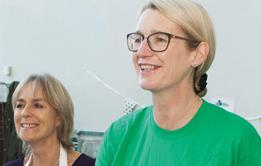Mobilising volunteers to support patients will become easy if we leverage people’s innate desire to help others, writes Jeremy Taylor

When people help other people, the world changes. Lynda Thomas’ interview reminds us of this powerful but simple truth.
Illness can affect every aspect of our lives. As patients, we are seen by experts who are highly trained and motivated to solve our medical problems.
No wonder we are sometimes disappointed by their inattention to our human needs. That is where people power comes in.
Peer support
Peer support in health is not new. It is, for example, the basic design principle of Alcoholics Anonymous, established 80 years ago.
The volunteering Lynda describes finds its counterparts in the worlds of mental health, older people’s care, diabetes and parenting sick children. It happens face to face, by phone and in online communities.
It is organised by large national charities like Macmillan and small, local groups.
There is a growing buzz about social approaches to supporting people’s health and wellbeing. If National Voices received £1 every time someone used the term “peer support” or “social prescribing”, we would be doing very nicely.
But what would make it mainstream?
Shift required
Firstly, clinical practice needs a decisive shift of mindset from “what is the matter with you” to “what matters to you?”
A conversation about a patient’s life, goals and preferences is a natural jumping-off point for considering social support. Shared decision making and personalised care planning really have to become the norm.
Secondly, we need reliable, trusted brokering mechanisms so that busy clinicians and managers can direct people to sources of social support in confidence, and without distraction. We need to learn from the most promising experiments in social prescribing and from those commissioners who are working out how to create productive partnerships with local communities and voluntary groups.
Thirdly, the research community needs to step up. As the recent National Voices/NESTA review shows, there is already a research base for the efficacy of peer support.
It needs to be better known. The economic case needs to be better made.
Initiatives such as Realising the Value should help. Social innovation should be seen like medical innovation: sexy, cutting edge – and worthy of research funding.
Lastly, as Lynda puts it, volunteering could do with a “rebrand”. Many of us want to share what we’ve learned from experience.Many of us want to “put something back”. We don’t all want to “volunteer”.
Let’s get smarter about mobilising the powerful desire to help.
Jeremy Taylor is chief executive of National Voices
Dawn of the volunteer revolution

Volunteering needs a ‘rebrand’, if its vital role in delivering sustainable healthcare is to be fully realised, believes the chief executive of Macmillan Cancer Support, writes Daloni Carlisle
- 1
- 2
 Currently
reading
Currently
reading
Jeremy Taylor: Mobilising volunteers to help patients
































No comments yet